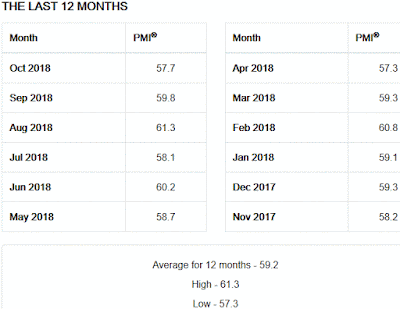ISM Manufacturing Index for October 2018
Earlier today, the Institute for Supply Management® (ISM®) released their Manufacturing Purchasing Manager's Index (PMI®) for October 2018:
Predicted: 59.1%
Actual: 57.7% (-2.1 points | -3.512% M/M change)
=========
Previous month: 59.8%
=========
Every month, the ISM surveys purchasing and supply executives at hundreds of companies across the country who are involved in manufacturing in some form. The resulting index is watched closely by academics, economists and investors because manufacturing accounts for about 12% of U.S. Gross Domestic Product (GDP).
The PMI is a reliable barometer of U.S. manufacturing: A PMI above 50% implies that U.S. manufacturing expanded during the month specified, while a reading below 50% implies that the made-in-the-USA sector contracted.
=========
From Today's Report:
The following is a sampling of quotes from a diverse pool of U.S. manufacturers:
=========
=========
Predicted: 59.1%
Actual: 57.7% (-2.1 points | -3.512% M/M change)
=========
Previous month: 59.8%
=========
Every month, the ISM surveys purchasing and supply executives at hundreds of companies across the country who are involved in manufacturing in some form. The resulting index is watched closely by academics, economists and investors because manufacturing accounts for about 12% of U.S. Gross Domestic Product (GDP).
The PMI is a reliable barometer of U.S. manufacturing: A PMI above 50% implies that U.S. manufacturing expanded during the month specified, while a reading below 50% implies that the made-in-the-USA sector contracted.
=========
From Today's Report:
"...Economic activity in the manufacturing sector expanded in October, and the overall economy grew for the 114th consecutive month, say the nation’s supply executives in the latest Manufacturing ISM® Report On Business®..."=========
The following is a sampling of quotes from a diverse pool of U.S. manufacturers:
- “All electronic components are having shortages and much longer lead times that impact our production.”
(Computer + Electronic Products)
- “Tariffs are causing inflation: increased costs of imports, increased cost of freight and increased domestic costs from suppliers who import.”
(Chemical Products)
- “Protein prices continue under pressure from heavy U.S. supplies and export concerns related to trade tariffs. Higher costs related to trade tariffs are starting to be passed on to the cost of goods sold.”
(Food, Beverage + Tobacco Products)
- “While order intake remains steady, the pace has slowed since the first half the year. Instead of growing, the backlog is declining. We were processing orders at a high level; now they are at the point of status quo from late 2017. We are not concerned yet, but there is certainly trepidation about the future.”
(Machinery)
- “NAFTA 2.0/USMCA does nothing to help our company, as it does not address Section 232 tariffs.”
(Plastics + Rubber Products)
- “We continue to run at full capacity. I continue to see pricing pressures and longer lead times in most commodities.”
(Primary Metals)
- “Mounting pressure due to pending tariffs. Bracing for delays in material from China — a rush of orders trying to race tariff implementation is flooding shipping and customs.”
(Miscellaneous Manufacturing)
- “Demand is high, and the supply chains are stressed.”
(Transportation Equipment)
- “Orders and shipments are strong right now. Backlog for Q4 and next year are way down. Savvy customers are asking us to hold pricing on blanket orders, but material suppliers will only hold prices for a few days, which puts us in a bad spot. We'll be spending as much as possible on capital improvements before the end of the year.”
(Fabricated Metal Products)
- “Steel tariffs continue to negatively affect our cost, even though we utilize U.S. sources for steel. Oil prices put meaningful upward pressure on cost. Continued tightness with truck drivers is expected.”
(Petroleum + Coal Products)
=========
=========
=========
Labels: hard_data, ism, manufacturing, pmi, purchasing_managers_index
|
--> www.FedPrimeRate.com Privacy Policy <--
CLICK HERE to JUMP to the TOP of THIS PAGE > SITEMAP < |




0 Comments:
Post a Comment
<< Home